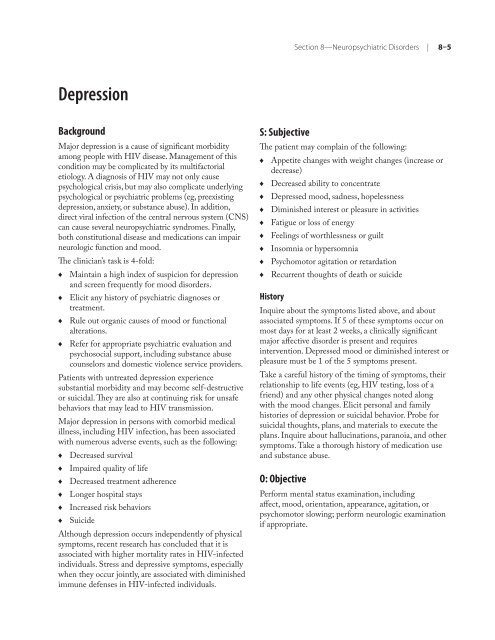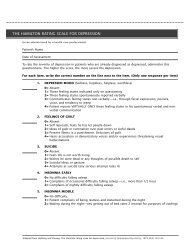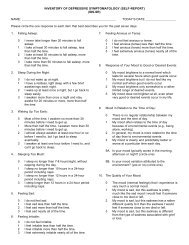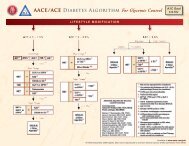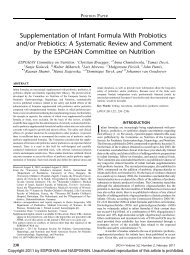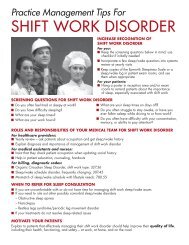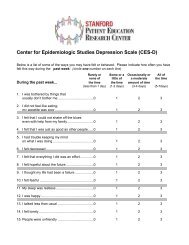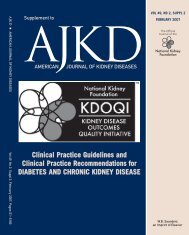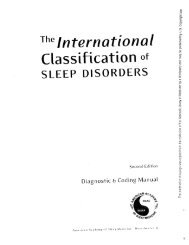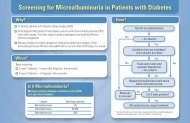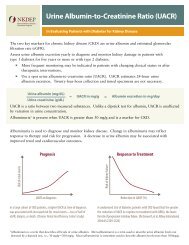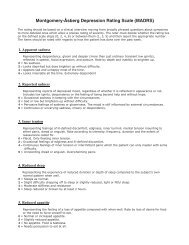Clinical Manual for Management of the HIV-Infected ... - myCME.com
Clinical Manual for Management of the HIV-Infected ... - myCME.com
Clinical Manual for Management of the HIV-Infected ... - myCME.com
Create successful ePaper yourself
Turn your PDF publications into a flip-book with our unique Google optimized e-Paper software.
Depression<br />
Background<br />
Major depression is a cause <strong>of</strong> significant morbidity<br />
among people with <strong>HIV</strong> disease. <strong>Management</strong> <strong>of</strong> this<br />
condition may be <strong>com</strong>plicated by its multifactorial<br />
etiology. A diagnosis <strong>of</strong> <strong>HIV</strong> may not only cause<br />
psychological crisis, but may also <strong>com</strong>plicate underlying<br />
psychological or psychiatric problems (eg, preexisting<br />
depression, anxiety, or substance abuse). In addition,<br />
direct viral infection <strong>of</strong> <strong>the</strong> central nervous system (CNS)<br />
can cause several neuropsychiatric syndromes. Finally,<br />
both constitutional disease and medications can impair<br />
neurologic function and mood.<br />
The clinician’s task is 4-fold:<br />
♦<br />
♦<br />
♦<br />
♦<br />
Maintain a high index <strong>of</strong> suspicion <strong>for</strong> depression<br />
and screen frequently <strong>for</strong> mood disorders.<br />
Elicit any history <strong>of</strong> psychiatric diagnoses or<br />
treatment.<br />
Rule out organic causes <strong>of</strong> mood or functional<br />
alterations.<br />
Refer <strong>for</strong> appropriate psychiatric evaluation and<br />
psychosocial support, including substance abuse<br />
counselors and domestic violence service providers.<br />
Patients with untreated depression experience<br />
substantial morbidity and may be<strong>com</strong>e self-destructive<br />
or suicidal. They are also at continuing risk <strong>for</strong> unsafe<br />
behaviors that may lead to <strong>HIV</strong> transmission.<br />
Major depression in persons with <strong>com</strong>orbid medical<br />
illness, including <strong>HIV</strong> infection, has been associated<br />
with numerous adverse events, such as <strong>the</strong> following:<br />
♦<br />
♦<br />
♦<br />
♦<br />
♦<br />
♦<br />
Decreased survival<br />
Impaired quality <strong>of</strong> life<br />
Decreased treatment adherence<br />
Longer hospital stays<br />
Increased risk behaviors<br />
Suicide<br />
Although depression occurs independently <strong>of</strong> physical<br />
symptoms, recent research has concluded that it is<br />
associated with higher mortality rates in <strong>HIV</strong>-infected<br />
individuals. Stress and depressive symptoms, especially<br />
when <strong>the</strong>y occur jointly, are associated with diminished<br />
immune defenses in <strong>HIV</strong>-infected individuals.<br />
S: Subjective<br />
Section 8—Neuropsychiatric Disorders | 8–5<br />
The patient may <strong>com</strong>plain <strong>of</strong> <strong>the</strong> following:<br />
♦<br />
♦<br />
♦<br />
♦<br />
♦<br />
♦<br />
♦<br />
♦<br />
♦<br />
Appetite changes with weight changes (increase or<br />
decrease)<br />
Decreased ability to concentrate<br />
Depressed mood, sadness, hopelessness<br />
Diminished interest or pleasure in activities<br />
Fatigue or loss <strong>of</strong> energy<br />
Feelings <strong>of</strong> worthlessness or guilt<br />
Insomnia or hypersomnia<br />
Psychomotor agitation or retardation<br />
Recurrent thoughts <strong>of</strong> death or suicide<br />
History<br />
Inquire about <strong>the</strong> symptoms listed above, and about<br />
associated symptoms. If 5 <strong>of</strong> <strong>the</strong>se symptoms occur on<br />
most days <strong>for</strong> at least 2 weeks, a clinically significant<br />
major affective disorder is present and requires<br />
intervention. Depressed mood or diminished interest or<br />
pleasure must be 1 <strong>of</strong> <strong>the</strong> 5 symptoms present.<br />
Take a careful history <strong>of</strong> <strong>the</strong> timing <strong>of</strong> symptoms, <strong>the</strong>ir<br />
relationship to life events (eg, <strong>HIV</strong> testing, loss <strong>of</strong> a<br />
friend) and any o<strong>the</strong>r physical changes noted along<br />
with <strong>the</strong> mood changes. Elicit personal and family<br />
histories <strong>of</strong> depression or suicidal behavior. Probe <strong>for</strong><br />
suicidal thoughts, plans, and materials to execute <strong>the</strong><br />
plans. Inquire about hallucinations, paranoia, and o<strong>the</strong>r<br />
symptoms. Take a thorough history <strong>of</strong> medication use<br />
and substance abuse.<br />
O: Objective<br />
Per<strong>for</strong>m mental status examination, including<br />
affect, mood, orientation, appearance, agitation, or<br />
psychomotor slowing; per<strong>for</strong>m neurologic examination<br />
if appropriate.


